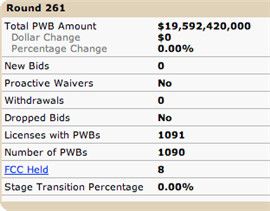From our front-page news:
The auction that felt like it was never going to end, has finally ended. The FCC-sponsored auction of the 700MHz spectrum hit a staggering $19.5 billion, far exceeding original expectations. As Ars Technica points out, $19 billion was hit in early February, so the last $0.5 billion really dragged things out.
Not surprisingly, the auction winners have not been disclosed, but the FCC promises the names to be revealed within ten days. Potential names are Google and Verizon, although many speculate that Google halted their bids early in the auction, which would be surprising to say the least.
As it stands though, the spectrum is not entirely freed up, and won't be until analog TV signals are ceased next February. It will be at that time when the winners will begin building their networks, so it may very-well take until late next year before we begin to see products using the spectrum.
<table align="center"><tbody><tr><td>

</td></tr></tbody></table>
One of those new entrants may be Google, which was one of the companies approved for participation in the auction. It's more likely that one of the major wireless players like Verizon will walk away with Block C; however, the FCC is expected to release the identities of the winning bidders soon.
Source: Ars Technica
Not surprisingly, the auction winners have not been disclosed, but the FCC promises the names to be revealed within ten days. Potential names are Google and Verizon, although many speculate that Google halted their bids early in the auction, which would be surprising to say the least.
As it stands though, the spectrum is not entirely freed up, and won't be until analog TV signals are ceased next February. It will be at that time when the winners will begin building their networks, so it may very-well take until late next year before we begin to see products using the spectrum.
<table align="center"><tbody><tr><td>

</td></tr></tbody></table>
One of those new entrants may be Google, which was one of the companies approved for participation in the auction. It's more likely that one of the major wireless players like Verizon will walk away with Block C; however, the FCC is expected to release the identities of the winning bidders soon.
Source: Ars Technica
